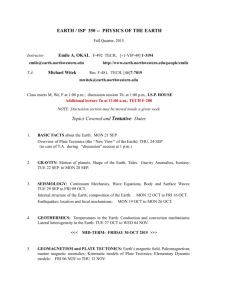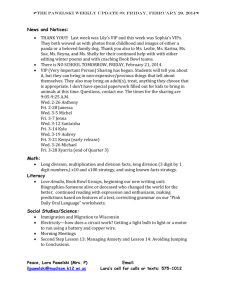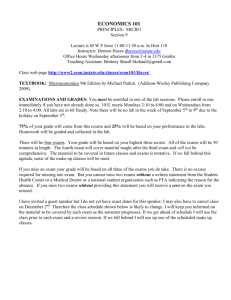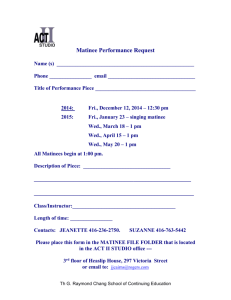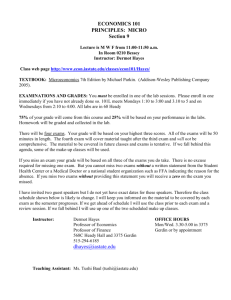HIS111 World Civilizations II Fall 2012, Point Loma Nazarene
advertisement
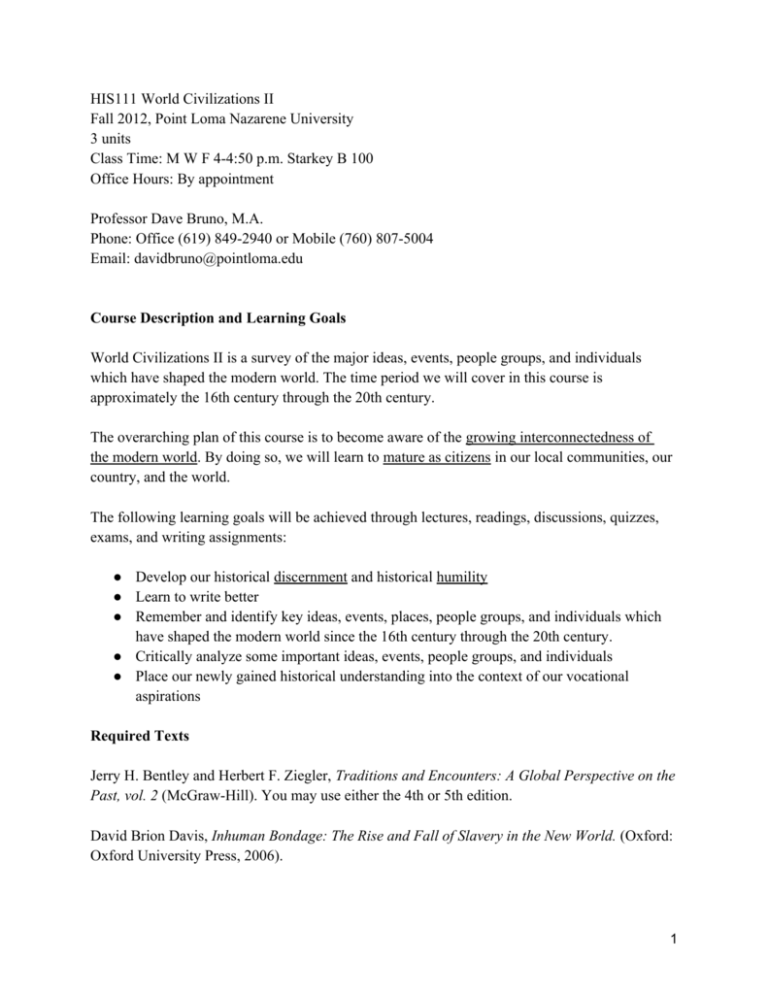
HIS111 World Civilizations II Fall 2012, Point Loma Nazarene University 3 units Class Time: M W F 4-4:50 p.m. Starkey B 100 Office Hours: By appointment Professor Dave Bruno, M.A. Phone: Office (619) 849-2940 or Mobile (760) 807-5004 Email: davidbruno@pointloma.edu Course Description and Learning Goals World Civilizations II is a survey of the major ideas, events, people groups, and individuals which have shaped the modern world. The time period we will cover in this course is approximately the 16th century through the 20th century. The overarching plan of this course is to become aware of the growing interconnectedness of the modern world. By doing so, we will learn to mature as citizens in our local communities, our country, and the world. The following learning goals will be achieved through lectures, readings, discussions, quizzes, exams, and writing assignments: ● Develop our historical discernment and historical humility ● Learn to write better ● Remember and identify key ideas, events, places, people groups, and individuals which have shaped the modern world since the 16th century through the 20th century. ● Critically analyze some important ideas, events, people groups, and individuals ● Place our newly gained historical understanding into the context of our vocational aspirations Required Texts Jerry H. Bentley and Herbert F. Ziegler, Traditions and Encounters: A Global Perspective on the Past, vol. 2 (McGraw-Hill). You may use either the 4th or 5th edition. David Brion Davis, Inhuman Bondage: The Rise and Fall of Slavery in the New World. (Oxford: Oxford University Press, 2006). 1 Additional readings will be linked in the syllabus, placed on reserve (electronic or physical) in Ryan Library, or handed out in class. Some Helpful Online Resources Modern History Sourcebook http://www.fordham.edu/Halsall/mod/modsbook.asp Christian Classics Ethereal Library http://www.ccel.org/ Library of Congress http://www.loc.gov/index.html Project Gutenberg http://www.gutenberg.org/wiki/Main_Page The Avalon Project http://avalon.law.yale.edu/default.asp iTunes University Lots Course Requirements and Expectations Attendance If you miss 5 classes, I will deduct one letter grade from your final grade. If you miss more than 5 classes, you and I will have a conference to discuss dropping you from the class. Reading Assignments All reading assignments should be read before the class for which it is assigned. Quizzes There are 4 scheduled quizzes and there probably will be pop quizzes from time to time. Exams There will be two midterm exams. Each is worth 100 points. Each exam will consist of multiple choice, true/false, matching, geography, and essay questions. Special Note: Any use of technology during a quiz or exam will result in an automatic failing grade for that quiz or exam. This includes using technology after you have finished but while other students are still taking the quiz or exam. 2 Final Project There will be a final project. Details of the final project will be provided in a handout and will be discussed in class. The purpose of the final project is to solve one of the world’s problems. You may accomplish this any way you choose. Papers There will be two response papers. The first is a biographical sketch. In the second, you must respond to a section of Inhuman Bondage. The papers should be 1-2 pages double spaced 12-point font. In-class Behavior This is your opportunity to receive negative points. I will deduct 10 points from your overall grade each time I have to stop class to ask you to stop disrupting class. Extra Credit Throughout the semester I will find opportunities for you to earn extra credit. Technology You can use technology in class for class purposes. Be careful, using technology is the easiest way to receive negative points for disrupting the class. Grades Grading is done on a points system. Therefore, you can always know your grade by keeping track of the total points you have received and dividing that by the total points possible. Roughly, the breakdown for grades is: 75 points 25 points each 100 points each 200 points Quizzes Papers Exams Final project ~ 14% of grade ~ 10% of grade ~ 38% of grade ~ 38% of grade 525 points total Use the following scale to determine your grade: 93% - 100% 90% - 93% 87% - 90% 83% - 87% 80% - 83% 77% - 80% 73% - 77% 70% - 73% = = = = = = = = A AB+ B BC+ C C- 3 68% - 70% 65% - 68% 60% - 65% 0% - 60% = = = = D+ D DF Academic Honesty This course follows the Academic Honesty policy found in the PLNU undergraduate catalog. Cases of cheating or plagiarism will likely result in a failing grade. From the PLNU Undergraduate Catalog http://www.pointloma.edu/experience/academics/catalogs/undergraduate-catalog/point-lomaeducation/academic-policies Academic Honesty The Point Loma Nazarene University community holds the highest standards of honesty and integrity in all aspects of university life. Academic honesty and integrity are strong values among faculty and students alike. Any violation of the university’s commitment is a serious affront to the very nature of Point Loma’s mission and purpose. Academic dishonesty is the act of presenting information, ideas, and/or concepts as one’s own when in reality they are the results of another person’s creativity and effort. Such acts include plagiarism, copying of class assignments, and copying or other fraudulent behavior on examinations. A faculty member who believes a situation involving academic dishonesty has been detected may assign a failing grade for a) that particular assignment or examination, and/or b) the course. The faculty member will file with the appropriate academic administrator and the department chair or school dean a written report of the incident and the action taken. The academic administrator, after an examination of the event, will submit a report to the Provost and the Vice President for Student Development. If either of these administrators believes other disciplinary action should be taken, consultation between the faculty member and the administrators will determine the resulting discipline. The student or students involved in the academic dishonesty may appeal the action by talking first to the department chair or school dean, then, if necessary, to the academic administrator, and finally to a committee of the following: an academic administrator of the student’s choice, the Vice Provost for Academic Administration, the Provost, and the Vice President for Student Development. The appeal decision reached by this committee is final. If a grade of “F” is received in a course due to academic dishonesty, the student may not withdraw from the course 4 nor can the course be dropped to remove the “F” grade. Academic Accommodation Each of you can succeed in this course! Please let me know as soon as possible if there are things I can do to help you. Students with disabilities may require academic accommodations. If you require academic accommodations, you must file documents with the Disability Resource Center (DRC), located in Bond Academic Center. After you file the documents, the DRC will contact me and provide written recommendations for reasonable accommodations to meet your needs. This policy assists the university in its commitment to full compliance with Section 504 of the Rehabilitation Act of 1973, the Americans with Disabilities (ADA) Act of 1990, and ADA Amendments Act of 2008, all of which prohibit discrimination against students with disabilities and guarantee all qualified students equal access to and benefits of PLNU programs and activities. Schedule Unit Intro Unit 1: Date Description Tue., Aug. 28 Reading: none Lecture: Course Introduction Wed., Aug. 29 Reading: none Video: http://www.ted.com/talks/ jk_rowling_the_fringe_benefits_of_failure.html J. K. Rowling, Harvard Commencement Address, we’ll watch in class Lecture and Discussion: History and Vocation Fri., Aug. 31 Reading: none Lecture and Discussion: History and Vocation cont’d Assignment Due: 1 page personal history Mon., Sept. 3 NO CLASS (Labor Day) Wed., Sept. 5 Reading: T&E5 Ch. 22 “Transoceanic Encounters and 5 Global Connections” Lecture: The World Becomes A Globe Backgrounds Fri., Sept. 7 LAST DAY TO ADD CLASS Fri., Sept. 7 Reading: T&E5 Ch. 22 “Transoceanic Encounters and Global Connections” Video: http://deimos3.apple.com/WebObjects/Core.woa/ Feed/ox-ac-uk-public-dz.4230920589.04230920591 Download on iTunes U and watch before class Lecture: The Universe Is No Longer A Circle Mon., Sept. 10 Reading: Trade Products https://www.lib.umn.edu/bell/ tradeproducts/ Lecture: The Products of Early-Modern Trade Wed., Sept. 12 Reading: TBD Lecture: Big-picture Overview Unit 2: Fri., Sept. 14 Ideas of the Early-Modern World Reading: T&E5 Ch. 23 Lecture: The Reformation Assessment: Quiz 1 Discussion: Ideas of the Early Modern World Mon., Sept. 17 Reading: T&E5 Ch. 23 Lecture: The Reformation Wed., Sept. 19 NO CLASS (At Hutchmoot) Assignment: Extra Credit listen to any Hutchmoot (Rabbitroom.com) related music or read any Hutchmoot related blog post and write a ½-1 page reflection = 1% on final grade Fri., Sept., 21 NO CLASS (At Hutchmoot) Mon., Sept. 24 Reading: T&E5 Ch. 23 Lecture: Introduction to Enlightenment philosophy Wed., Sept. 26 Reading: T&E5 Ch. 23 Lecture: More Enlightenment philosophy and science Fri., Sept. 28 NO CLASS (TEDx) Mon., Oct. 1 Reading: T&E5 Ch. 23 Lecture: Political developments Wed., Oct. 3 Reading: T&E5 Ch. 23 Lecture: Political developments 6 Unit 3: Slavery and Abolition Fri., Oct. 5 Reading: Charter of the Dutch West India Co. 1621 http:/ /avalon.law.yale.edu/17th_century/westind.asp Lecture: Where does wealth come from? Assessment: Quiz 2 Discussion: Where does wealth come from? Mon., Oct. 8 Reading: Lecture: Economic developments Assessment: Biography Response Paper Due Wed., Oct. 10 Reading: Watch before class: Does Capitalism Have A Soul? https://vimeo.com/17649390 Lecture: Economic developments Discussion: Does capitalism have a soul? Fri., Oct. 12 Reading: Lecture: Review Discussion: Review Mon., Oct. 15 Assessment: Mid-term exam Wed., Oct 17 Reading: Inhuman Bondage Lecture: African and the Atlantic World Discussion: Slavery and the modern world Fri., Oct. 19 NO CLASS (Fall Break) Mon., Oct. 22 Reading: T&E5 Ch. 25; Inhuman Bondage; Frederick Douglas, The Life of Frederick Douglas http:// www.gutenberg.org/ebooks/23 Chs. 1-2, more if you’d like. Lecture: Slavery Wed., Oct. 24 Reading: T&E5 Ch. 25 and Inhuman Bondage Lecture: Slavery Fri., Oct. 26 Reading: Inhuman Bondage; video in class, Wilberforce Lecture: Abolition Mon., Oct 29 Reading: Inhuman Bondage; William Wilberforce 1789 abolition speech before parliament: http:// www.brycchancarey.com/abolition/wilberforce2.htm Lecture: Abolition Wed., Oct. 31 Reading: Lecture: “Modern-day Slavery” Guest Lecture with Jamie Gates, director of the Center for Justice & Reconciliation 7 Unit 4: Empires Unit 5: Revolutions Fri., Nov. 2 LAST DAY TO DROP CLASS Fri., Nov. 2 Reading: Tera Hunter, “Putting an Antebellum Myth to Rest,” http://www.nytimes.com/2011/08/02/opinion/ putting-an-antebellum-myth-about-slave-families-torest.html Assessment: Quiz 3 Lecture: TBD Mon., Nov. 5 Reading: T&E5 Ch. 26 Lecture: China Assessment: Slavery/Abolition Response Paper Due Wed., Nov. 7 Reading: T&E5 Ch. 26 Lecture: China Fri., Nov. 9 Reading: T&E5 Ch. 27 Lecture: Islamic Empires Mon., Nov. 12 Reading: T&E5 Ch. 27 Lecture: Islamic Empires Wed., Nov. 14 Reading: TBD Lecture: Islam today Fri., Nov. 16 Reading: none Lecture: Review Mon., Nov. 19 Assessment: Mid-term exam Wed., Nov 21 NO CLASS (Thanksgiving) Fri., Nov. 23 NO CLASS (Thanksgiving) Mon., Nov. 26 Reading: T&E5 Ch. 28; Patrick Henry speech at Virginia Convention: http://www.law.ou.edu/ushistory/ henry.shtml; Benjamin Franklin speech at Constitutional Convention: http://avalon.law.yale.edu/18th_century/ debates_917.asp Lecture: American Revolution Wed., Nov. 28 Reading: T&E5 Ch. 28 Lecture: French Revolution Fri., Nov. 30 Reading: T&E5 Ch. 29 Lecture: Industrial Revolution Assessment: Quiz 4 8 Unit 6: Ideas of Modernity Mon., Dec. 3 Reading: Reserve at Ryan Library: Samuel P. Hays, The Response to Industrialism Chs. 1-2, 9. Lecture: Reactions to modernity Assessment: Final Project Due Wed., Dec. 5 Reading: T&E5 Ch. 34; “Abundance on Trial” http://www.iasc-culture.org/THR/ THR_article_2012_Summer_Yates.php Lecture: The idea of progress Fri., Dec. 7 Reading: T&E5 Chs. 33, 36 Lecture: War and humanity Fri., Dec. 14 FINAL EXAM SCHEDULED 3:30-5:30 This syllabus is subject to change by written and distributed addendum. 9



